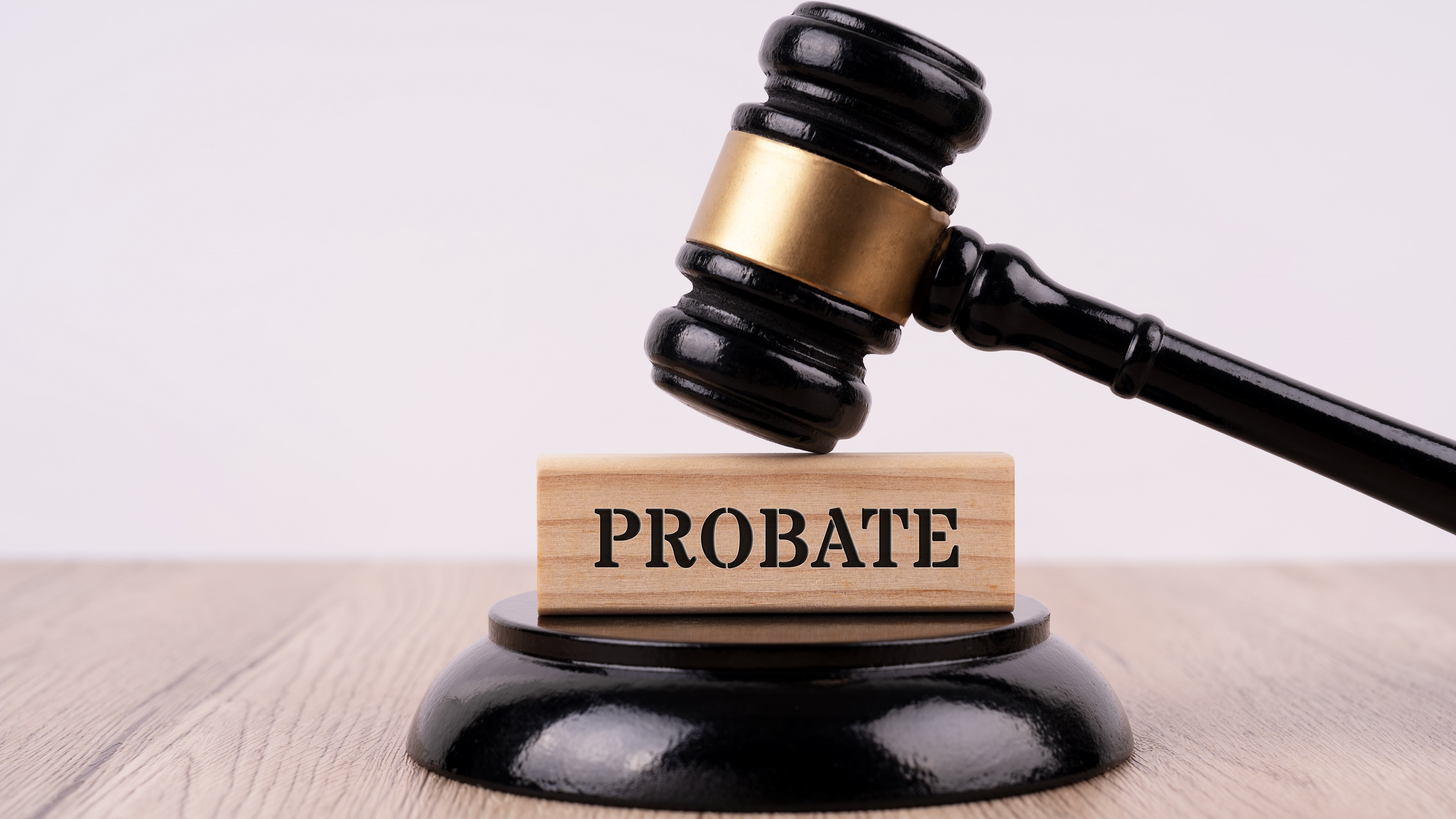What Is Probate, and Who Has to Deal With It?
The probate process can be a long and expensive journey for heirs. Real estate, cars and even art often trigger probate, but other assets get a free pass.


Profit and prosper with the best of Kiplinger's advice on investing, taxes, retirement, personal finance and much more. Delivered daily. Enter your email in the box and click Sign Me Up.
You are now subscribed
Your newsletter sign-up was successful
Want to add more newsletters?

Delivered daily
Kiplinger Today
Profit and prosper with the best of Kiplinger's advice on investing, taxes, retirement, personal finance and much more delivered daily. Smart money moves start here.

Sent five days a week
Kiplinger A Step Ahead
Get practical help to make better financial decisions in your everyday life, from spending to savings on top deals.

Delivered daily
Kiplinger Closing Bell
Get today's biggest financial and investing headlines delivered to your inbox every day the U.S. stock market is open.

Sent twice a week
Kiplinger Adviser Intel
Financial pros across the country share best practices and fresh tactics to preserve and grow your wealth.

Delivered weekly
Kiplinger Tax Tips
Trim your federal and state tax bills with practical tax-planning and tax-cutting strategies.

Sent twice a week
Kiplinger Retirement Tips
Your twice-a-week guide to planning and enjoying a financially secure and richly rewarding retirement

Sent bimonthly.
Kiplinger Adviser Angle
Insights for advisers, wealth managers and other financial professionals.

Sent twice a week
Kiplinger Investing Weekly
Your twice-a-week roundup of promising stocks, funds, companies and industries you should consider, ones you should avoid, and why.

Sent weekly for six weeks
Kiplinger Invest for Retirement
Your step-by-step six-part series on how to invest for retirement, from devising a successful strategy to exactly which investments to choose.
Managing and securing your estate is one of the most important steps in personal finance. An estate plan ensures your assets get distributed according to your wishes. In addition to mitigating confusion and hardship for your loved ones, it also limits the court’s control over your assets in probate.
What is probate?
Probate is the legal process for reviewing, managing and distributing someone’s estate after they die. The purpose of probate is to verify the validity of your estate plan. It includes reviewing the legitimacy of wills, handling any outstanding debts and taxes, appraising property values and dividing assets among heirs.
The probate process is in place to protect your estate, working to prevent fraud after your death. But this legal proceeding doesn’t look the same for everyone. Some assets are required to go through probate — especially if you die without a will or fail to name beneficiaries for some of your accounts.
From just $107.88 $24.99 for Kiplinger Personal Finance
Become a smarter, better informed investor. Subscribe from just $107.88 $24.99, plus get up to 4 Special Issues

Sign up for Kiplinger’s Free Newsletters
Profit and prosper with the best of expert advice on investing, taxes, retirement, personal finance and more - straight to your e-mail.
Profit and prosper with the best of expert advice - straight to your e-mail.
Assets subject to probate
Real estate properties with a single owner who is deceased will most likely have to go through probate. This includes properties such as single-family homes and condominiums. If the deceased homeowner has a will, the court will distribute the home according to the instructions left in the will. The property will be distributed according to state laws if the owner doesn't have a will.
Vehicles such as cars, motorcycles and boats will probably have to go through the probate process, too. If there’s a will, the vehicle will be distributed accordingly, but the process gets more complicated if there isn’t. Specific rules and regulations vary depending on the state you live in.
Personal belongings like art and jewelry must go through probate. If these items are of high value, they’ll also need to be appraised.
Bank accounts, life insurance policies, stocks and bonds owned solely by the deceased person must all go through probate if a beneficiary is not named.
Probate can be long and costly
Settling an estate through probate is no quick process. The size of the estate, the value of certain assets, and state-specific probate laws can all impact the length of time it will take to finalize the estate. The situation can become even more complicated and drawn out if there are questions or concerns about the validity of a will, or if the family cannot agree on the division of assets.
The amount of time it takes to settle the estate will also affect how much you’ll pay to go through the probate process. You’ll be required to pay certain expenses, including outstanding debts, court and filing fees and lawyer costs. You may also be required to pay a state inheritance tax, if you live in one of the six states that impose them on some recipients.
Probate laws vary
Where you live, the size of your estate and the value of your assets all impact the probate process. In some states, estates that don’t meet a certain monetary value may be able to bypass these proceedings entirely. Similarly, certain assets in the estate aren’t subject to probate so long as they have beneficiaries designated. These assets range from pension plans, life insurance plans, medical savings accounts and IRAs. Additionally, due to survivorship rights, assets jointly owned typically aren’t required to go through probate.
Some other strategies for getting around probate include utilizing a trust or distributing assets to heirs via affidavit.
Probate can be a lot to handle, especially following the death of a loved one. But if you’re proactive with your estate planning, the probate process should be a last resort for surviving family members. Creating a concise, detailed will and naming beneficiaries to any accounts can help your loved ones avoid these proceedings, potentially saving them time and money, while mitigating any feuds or disagreements.
Pat Simasko is an investment advisory representative of and provides advisory services through CoreCap Advisors, LLC. Simasko Law is a separate entity and not affiliated with CoreCap Advisors. The information provided here is not tax, investment or financial advice. You should consult with a licensed professional for advice concerning your specific situation.
Related Content
- Leaving Property to Multiple Heirs? What to Consider
- Naming Beneficiaries for Inherited IRAs: What You Need to Know
- The Basics of Estate Planning
- What Assets Should You Put (or Not Put) in Your Trust?
- How Quitclaim Deeds Can Cause Estate Planning Catastrophes
Profit and prosper with the best of Kiplinger's advice on investing, taxes, retirement, personal finance and much more. Delivered daily. Enter your email in the box and click Sign Me Up.

Patrick M. Simasko is an elder law attorney and financial adviser at Simasko Law and Simasko Financial, specializing in elder law and wealth preservation. He’s also an Elder Law Professor at Michigan State University School of Law. His self-effacing character, style and ability have garnered him prominence and recognition throughout the metro Detroit area as well as the entire state.
-
 Quiz: Do You Know How to Avoid the "Medigap Trap?"
Quiz: Do You Know How to Avoid the "Medigap Trap?"Quiz Test your basic knowledge of the "Medigap Trap" in our quick quiz.
-
 5 Top Tax-Efficient Mutual Funds for Smarter Investing
5 Top Tax-Efficient Mutual Funds for Smarter InvestingMutual funds are many things, but "tax-friendly" usually isn't one of them. These are the exceptions.
-
 AI Sparks Existential Crisis for Software Stocks
AI Sparks Existential Crisis for Software StocksThe Kiplinger Letter Fears that SaaS subscription software could be rendered obsolete by artificial intelligence make investors jittery.
-
 Social Security Break-Even Math Is Helpful, But Don't Let It Dictate When You'll File
Social Security Break-Even Math Is Helpful, But Don't Let It Dictate When You'll FileYour Social Security break-even age tells you how long you'd need to live for delaying to pay off, but shouldn't be the sole basis for deciding when to claim.
-
 I'm an Opportunity Zone Pro: This Is How to Deliver Roth-Like Tax-Free Growth (Without Contribution Limits)
I'm an Opportunity Zone Pro: This Is How to Deliver Roth-Like Tax-Free Growth (Without Contribution Limits)Investors who combine Roth IRAs, the gold standard of tax-free savings, with qualified opportunity funds could enjoy decades of tax-free growth.
-
 One of the Most Powerful Wealth-Building Moves a Woman Can Make: A Midcareer Pivot
One of the Most Powerful Wealth-Building Moves a Woman Can Make: A Midcareer PivotIf it feels like you can't sustain what you're doing for the next 20 years, it's time for an honest look at what's draining you and what energizes you.
-
 I'm a Wealth Adviser Obsessed With Mahjong: Here Are 8 Ways It Can Teach Us How to Manage Our Money
I'm a Wealth Adviser Obsessed With Mahjong: Here Are 8 Ways It Can Teach Us How to Manage Our MoneyThis increasingly popular Chinese game can teach us not only how to help manage our money but also how important it is to connect with other people.
-
 Looking for a Financial Book That Won't Put Your Young Adult to Sleep? This One Makes 'Cents'
Looking for a Financial Book That Won't Put Your Young Adult to Sleep? This One Makes 'Cents'"Wealth Your Way" by Cosmo DeStefano offers a highly accessible guide for young adults and their parents on building wealth through simple, consistent habits.
-
 Global Uncertainty Has Investors Running Scared: This Is How Advisers Can Reassure Them
Global Uncertainty Has Investors Running Scared: This Is How Advisers Can Reassure ThemHow can advisers reassure clients nervous about their plans in an increasingly complex and rapidly changing world? This conversational framework provides the key.
-
 I'm a Real Estate Investing Pro: This Is How to Use 1031 Exchanges to Scale Up Your Real Estate Empire
I'm a Real Estate Investing Pro: This Is How to Use 1031 Exchanges to Scale Up Your Real Estate EmpireSmall rental properties can be excellent investments, but you can use 1031 exchanges to transition to commercial real estate for bigger wealth-building.
-
 Should You Jump on the Roth Conversion Bandwagon? A Financial Adviser Weighs In
Should You Jump on the Roth Conversion Bandwagon? A Financial Adviser Weighs InRoth conversions are all the rage, but what works well for one household can cause financial strain for another. This is what you should consider before moving ahead.